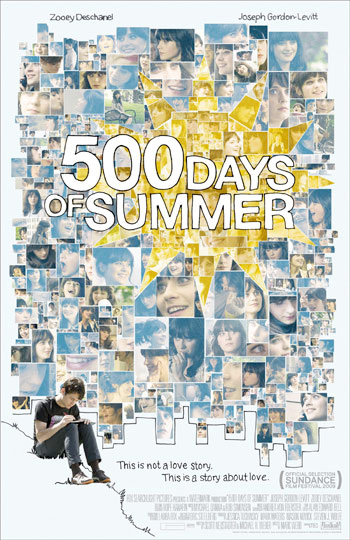500 Days of Summer and Annie Hall share many things in common. For one, the films both begin with the admission that the focal relationships in question are unequivocally over and the male component is already on the other side. Each movie uses a fractured timeline in its conveyance of the emotion of a relationship, which is to say neither follows a primarily linear path. 500 Days of Summer uses the technique in a much more mannered way, informing the audience of the exact day (of 500) in which we find main character, Tom (Joseph Gordon-Levitt). Woody Allen in Annie Hall uses quick, jarring cuts to and fro throughout the relationship chiefly to juxtapose a moment either in the past or the future that is especially ironic when viewed next to an opposite from another time. There are many scenes in 500 Days of Summer that call back almost exactly to moments of Annie Hall. Specifically, a scene in which split screen is used to show Tom's expectations of a night at a party to the reality of how it actually happens. Webb noted that this scene in particular was a more modern spin on a scene in Hall when a conversation between Diane Keaton and Woody Allen is subtitled to juxtapose what the characters are saying with what they are thinking. If anything can be said about these two films as far as my comparisons are going, it's that one precludes the other and each attempts to reach the same endpoint via different means.
So, heaping these kinds of connections between a fairly new independent film and what is considered by many to be a classic film could be construed as being premature. In truth, when examining the subject matter in both films (that of a relationship that seems like everything and becomes nothing just as quickly with little reasoning) I find that both work in tandem towards similar interests. This is not to say the films are complimentary, or in some cases, even comparable. Simply the two take similar journeys and end up with different theses on the same subject. So what are the differences?
For one, 500 Days of Summer is much more concerned with cinematic style than Woody Allen's Oscar winning film, but not to the detriment of its story. 500 Days is told through music and bold camera work. In many ways its soundtrack is analogous to the way the current generation copes with many of the various foibles of life and love (that is to say, through music). It helps that said soundtrack is for the most part pitch perfect. A collection of offbeat, lesser known indie tracks perfectly supplements the moods Gordon-Levitt traverses throughout the film. This movie also employs an interesting twist on genre convention, focusing primarily on the male perspective in the story as well as putting said gentleman in the saddle of the hopeless romantic. It's basic role reversal, but it feels extremely fresh in this instance as movies rarely explore this interesting but no less real dynamic. Less of a romantic comedy and more of a coming-of-age tale, 500 Days of Summer deals with the realization that things like fate and destiny rarely align the stars in the ways we would like, and how naivety on this part can be the distinction between being a child or accepting adulthood. It warns of the danger of turning people into ideals, but does not abandon the audience completely to cynicism. Reassuringly, the film portends that ideals can be met with effort, or a lack of fear of putting oneself 'out there'. It never compromises on the hurt and pain of love and how it feels to lose it, but it's willing to offer a glimmer of hope with a wink to the audience before the final credits.
The setting of 500 Days is also unique in a few ways. For one, the director and cinematographer went to great lengths to capture the beauty of lesser known parts of LA. By doing so, Tom and Summer inhabit an almost postcard-world filled with vibrant colors and unreal focus. This elevates the narrative to an almost super-reality which is quite nicely anchored by some truly real emotional beats played out between the main characters. More than once while viewing this film I was struck by how accurate and real the interactions on screen were to life. Sure, this movie was taking place in an idealized setting, but the humans in it carry a certain reality and honesty I am hard pressed to identify in many other recent films of this nature. This is perhaps the film's greatest strength, and it allows the movie to play out in a way that is at once evocative visually of the way being in a relationship sometimes feels, while at the same time genuinely hitting these moments on a very personal level. These elements going hand in hand so well is something of a miracle, and it adds in spades to the charm of this story.
In the end, 500 Days of Summer is more an examination of what it means to grow up when something as tumultuous as love is the catalyst than it is of romance. It is a film of sometimes brutal honesty and tender humor that aims to almost empathize with the audience in shared misery, while at the same time trying earnestly to offer the hope that the world isn't as bleak as it can seem through the lens of our perceptions. It falls victim to one to three pitfalls of 'indie' movie making, but for the most part 500 Days of Summer is a challenging film that is not afraid to be honest about the harshness of life and love but will good-heartedly chuckle at it too.


No comments:
Post a Comment